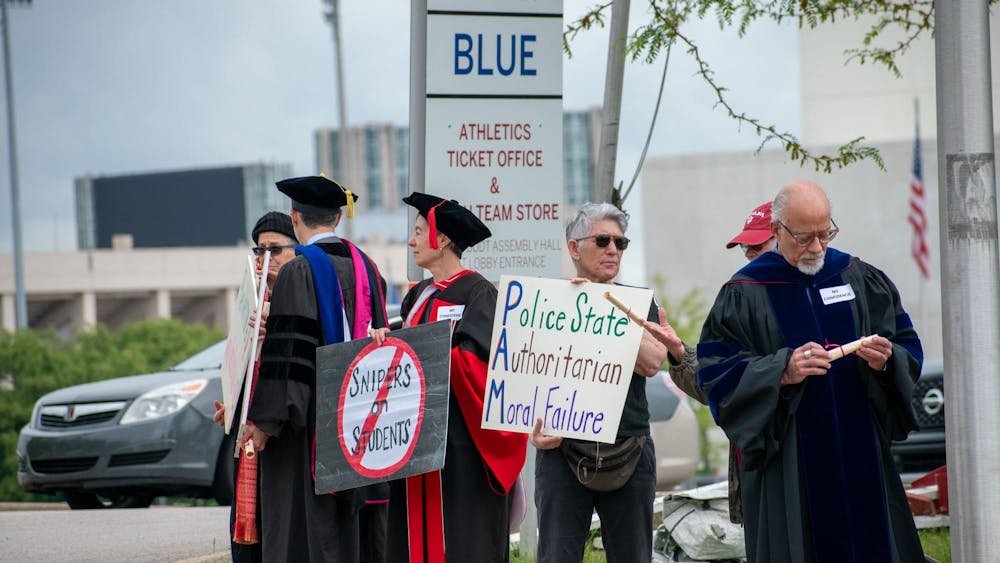Maintaining the joy of learning is a fundamental element in the library’s new mentoring program. The program utilizes both this space, available to all ages, and the Ground Floor, a space for ages 12-19, Digital Creativity Specialist iJeannette Lehr said.
Level Up and the Ground Floor opened March 1. Kevin MacDowell, Teen Services and Digital Creativity strategist, said the director of the library at the time, Sara Laughlin, began research for the project more than four years ago.
Laughlin saw a national trend in libraries providing services for younger generations in order to make themselves more relevant, MacDowell said.
“Libraries are looking for ways to serve this generation of the public now, and since there’s so much digital creativity in society, we had to find a way to meet that need,” Lehr said.
MacDowell said the mentoring program at the MCPL was created to inspire digital creativity specifically in teens but also in Monroe County as a whole.
Lehr, hired to assemble equipment and software for the new spaces, said Level Up is there for anyone who wants to create any kind of project.
“If there’s a 5-year-old who wants to make a movie, we’ll definitely help them do it,” Lehr said.
MacDowell said Level Up and its green screen, HD camera, shotgun microphone, an extensive selection of software, laptops and iPads are all available to teens.
Mentors are there to encourage teens and children to learn valuable skills through their interests, whether they are working at the arts and crafts station, playing Super Smash Bros on the Wii U or just listening to music, MacDowell said.
“It’s an opportunity to hook on to what they’re doing and turn it into something that’s a little bit more intentional, more organized, with more of an end product in mind,” MacDowell said.
This could be making a time-lapse video documenting the process of making a design with Perler beads or designing their own iOS app.
MacDowell said another key aspect of the mentoring process is related to the 40 Developmental Assets, which help teens transition to successful adulthood.
“One of the biggest elements is having positive relationships with adults other than parents and teachers,” MacDowell said. “The mentor program is an attempt to first and foremost give an opportunity to provide those types of relationships.”
MacDowell said the mentors use the bonds they make with the students to give them a push toward learning marketable skills.
“We want to get kids to try new things and really geek out on a project,” MacDowell said. “The thread through all of that is connected learning, which is simply that anyone learns best when what they are learning is somehow connected to an interest of theirs.”
In the Ground Floor, there are paper dolls hidden by the bookshelves and toys remade to form creatures such as a stegosaurus with a doll arm as a tail.
Unsurprisingly, these spaces are mostly used for socializing, MacDowell said.
“We see some reading but, as librarians, not as much as we would like,” MacDowell said. “At its busiest, this space is loud and busy. We suspect that a lot of teens who are voracious readers may be a little turned off by this space because there is no real place for truly silent reading.”
Although the space might not be ideal for the avid reader, it is a place that fosters other kinds of creative thought and production.
The white board wall, visible in the entryway, serves as a place for patrons to show their talent in artwork and poetry. The most prominent piece on the wall currently is a five foot tall Expo marker dragon, intricately patterned and colored.
MacDowell said he walks around the board every morning before going into his office to see if anything has been added — not for anything inappropriate but for the impressive displays.
“Some of what gets written and drawn bares these teens’ souls a little bit,” MacDowell said. “Their feelings get put on this board, and sometimes it’s quite profound and moving.”
The real challenge of the mentoring program is turning the raw creativity, energy and social tendencies of young adults into tangible products while teaching them digital and technological skills, MacDowell said.
“If IU students enjoy the company of teens and want to be a part of figuring out ways to creatively trick teenagers into trying things that they didn’t think they wanted to try, they would be perfect mentors,” MacDowell said.





